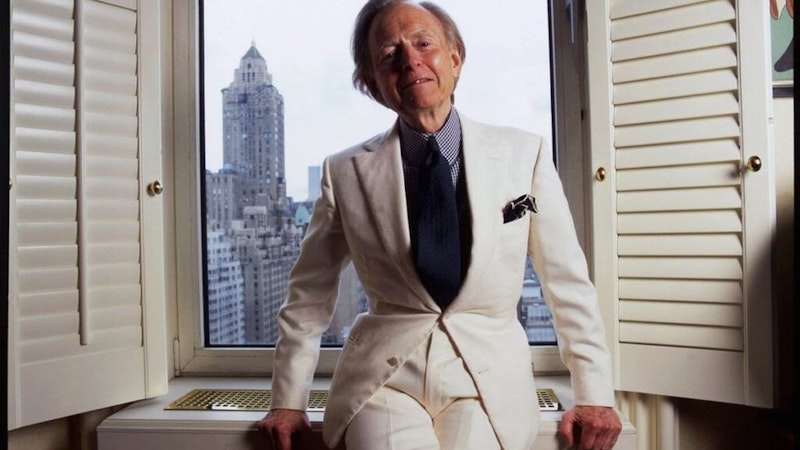I can't count how many times I've assumed that someone, based on their writing, is an asshole, after which I met the person and found that I liked them a lot. With Tom Wolfe, more than one person says in the first-rate new documentary Radical Wolfe, there were key differences between Wolfe the man and Wolfe the writer. He cultivated the air of a gentleman who people liked a lot, yet would write the most cutting things you can imagine.
"Such a polite person, with a pen in his hand could be a terrorist,” Gay Talese says.
Radical Wolfe is the first major documentary about Wolfe, arriving five years after his death in 2018. Directed by Richard Dewey and adapted from a 2015 Vanity Fair article by Michael Lewis, the film has three key components: Literary talking heads discussing Wolfe’s work and social persona, vintage footage of Wolfe interviewed on talk shows, and Wolfe’s words himself, read by Jon Hamm.
All three are delightful. Lewis, Talese, Niall Ferguson, Tom Junod (and for some reason, Peter Thiel) offer valuable insights about Wolfe, while the talk show interviews come from Dick Cavett to David Letterman to Jon Stewart. And while Hamm isn’t a natural choice to voice the author’s words, it’s great hearing the actor getting his mouth around Wolfe-isms like “moist labial piping little birds” (the author’s description, from The Right Stuff, of the women who sought to get close to the Mercury astronauts).
The film’s about Wolfe and his place in literary history, even beyond his work in the New Journalism of the 1960s and 70s. Like a lot of major writers of his generation, he had a persona. But he wasn’t a hellraiser like Hunter S. Thompson, or a pugilist like Norman Mailer. Instead, the Virginian in New York was a dandy, favoring white suits and leading a sincere, uncontroversial personal life as a family man.
The film shows that Wolfe developed a disdain for the establishment that he later carried with him to his pioneering career in Manhattan. It's a dynamic that's familiar today: Wolfe was often at odds with the establishment of the day, yet doing so never hurt his career much; it probably helped him.
There are sections of the film on most of Wolfe’s major works, starting with The Electric Kool-Aid Acid Test and continuing with the Leonard Bernstein/"Radical Chic" episode—which, I'm told, the forthcoming Bradley Cooper-directed Bernstein biopic omits—and The Right Stuff, the only work of Wolfe’s to result in a decent film.
Then there’s the debut novel The Bonfire of the Vanities, Wolfe’s definitive novel about Reagan-era New York City. Bonfire is a book that everyone who moves to New York City should read, as I did around when I arrived there in 2000. It was made into a terrible movie in 1990 by Brian De Palma, with such casting misfires as Tom Hanks as a Wall Street swinging dick and Bruce Willis is a drunken British journalist. It couldn't even do anything useful with Wolfe's masterful scene of a mogul dying at the dinner table. I've long hoped some brave filmmaker would give adapting Bonfire another crack, maybe as a mini-series (Netflix will soon bring out a series based on another Wolfe novel, A Man in Full).
The film also examines Wolfe’s twilight, especially his so-so novel I Am Charlotte Simmons, from 2004, which had a nearly 75-year-old Wolfe trying but mostly failing to find things to say about college kids and customs of the day. Not that obsession with the goings-on on campus, by people who should be too old to care about such things, is a phenomenon that has receded in any way.

